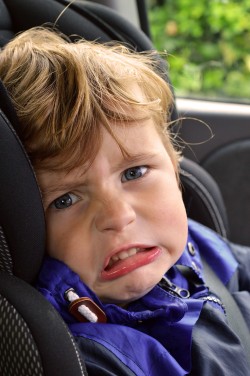Just Car Sickness?
We’ve talked about the connection between migraine and car sickness or motion sickness before. Many migraine patients suffered from motion sickness as children.

It’s interesting to look back to see possible roots of our migraine condition in childhood – but what about children who have motion sickness now?
A study published this year in the European Journal of Paediatric Neurology reviewed the cases of 23 patients who suffered from motion sickness under the age of 18. Almost half were diagnosed with migraine (47.8%). (Abstract: Severe motion sickness in infants and children)
But there were other issues as well. Recurrent/chronic otitis media was diagnosed in 39.1%. There was a history of motor delay in 30.4%. And “vestibular deficits” were diagnosed in 23.5%.
Otitis media refers to an inflammation or infection of the middle ear, which can come from a variety of causes.
Motor delay refers to childhood development. The most commonly discussed is the age at which someone learns to walk – if there’s a delay beyond a certain typical age, that’s a motor delay.
Vestibular deficits are issues with the vestibular system in particular, which can lead directly to dizziness or balance problems.
The study was not trying to necessarily find the cause of motion sickness. It simply points out connections between motion sickness and other conditions.
Sometimes these are hard to diagnose. In fact, patients who have vestibular conditions have often been referred to a psychiatrist. Why? Because of the way these disorders can make it difficult to function. For example, they may become anxious in a crowd, or in wide open spaces (an interesting discussion here – Visual Preference and Vestibular Deficiency).
So what do we learn from the study? Although we cannot prove direct causation here, we can see that there are a variety of things that may be connected to – and may cause – motion sickness.
It’s easy to just say, “Well, Emma gets car sick, but Aiden doesn’t. It’s just the way they are.” But in fact, car sickness may be a clue that can help us diagnose a condition early, before things get worse.
Of course diagnosing migraine early can make all the difference – and that includes what is sometimes called vestibular migraine. Infections of the ear are, of course, very important to treat. And other vestibular problems can cause long term issues because of the way the body may try to compensate for the issue. Motor delay as well can come from a number of causes, but it’s likely to be the issue that parents are most aware of already.
So don’t ignore motion sickness in children – especially if it’s severe or consistent (we’re not talking about too much candy on a 5 hour trip while playing Minecraft upside down). It can actually help avoid more problems throughout life if we use it as a clue to solve a mystery.
See also: Good News for Children with Vertigo
